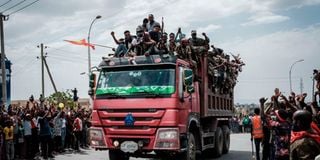Premium
Ethiopia bans media from covering military operations

Tigray soldiers arriving in Mekele on June 29, 2021. The Ethiopian government has issued an order banning media from covering military operations as war the continues.
What you need to know:
- The ban comes a week after the Ethiopian Media Authority issued a warning to some international media houses regarding their coverage on the ongoing Tigray conflict
The Ethiopian government has issued an order banning media from covering military operations as war continues to grave the populous and largest nation in the Horn of Africa.
In a tweet, Prime Minister Abiy Ahmed’s administration has asked media practitioners to desist from reporting military operations in his country.
However, the ban isn’t clear when the ban covers or targets both local and international media.
The Central Command of the Ethiopian National Defense Forces announced that the media had been banned from reporting on military operations, battlefields and fighting results.
The general ban comes a week after the Ethiopian Media Authority issued a warning to some international media houses regarding their coverage on the ongoing conflict.
The warning was issued to BBC World News, CNN, Reuters and the Associated Press, with the government threatening it will revoke their licenses for reporting fake news, among others.
In 2019, Ethiopia rose 40 positions to 110th in Reporters Without Borders World Press Freedom Index and to 99 in 2020 only to slip to 101 in 2021 as the moderator noted.
According to Reporters without Borders (RSF), within months of Abiy taking office in 2018, a new space for freedom of expression had been created by the release of many detained journalists and bloggers and by the decision to restore access to more than 200 news websites and blogs that had been blocked for years.
But then the many clashes around the country helped to increase the polarisation of the media landscape, which has not been spared the effects of abusive actions by authorities, according to RSF.
RSF stressed that the troubled environment has led to the re-emergence of old bad habits, with more than ten journalists arrested in 2020 over mostly unclear reasons, citing that some were held incommunicado, without access to a lawyer, for several weeks.
The media advocacy entity said that in February 2021, a respected reporter for several foreign media outlets received a visit at her Addis Ababa home from gunmen who threatened her in connection with her coverage of the civil war in the northern Tigray region.
It revealed that access to regions with conflicts has become difficult and Internet cuts are common, stressing that Draconian laws that affect the press, including the 2009 terrorism law, which was widely used to detain journalists, have still not been amended.





